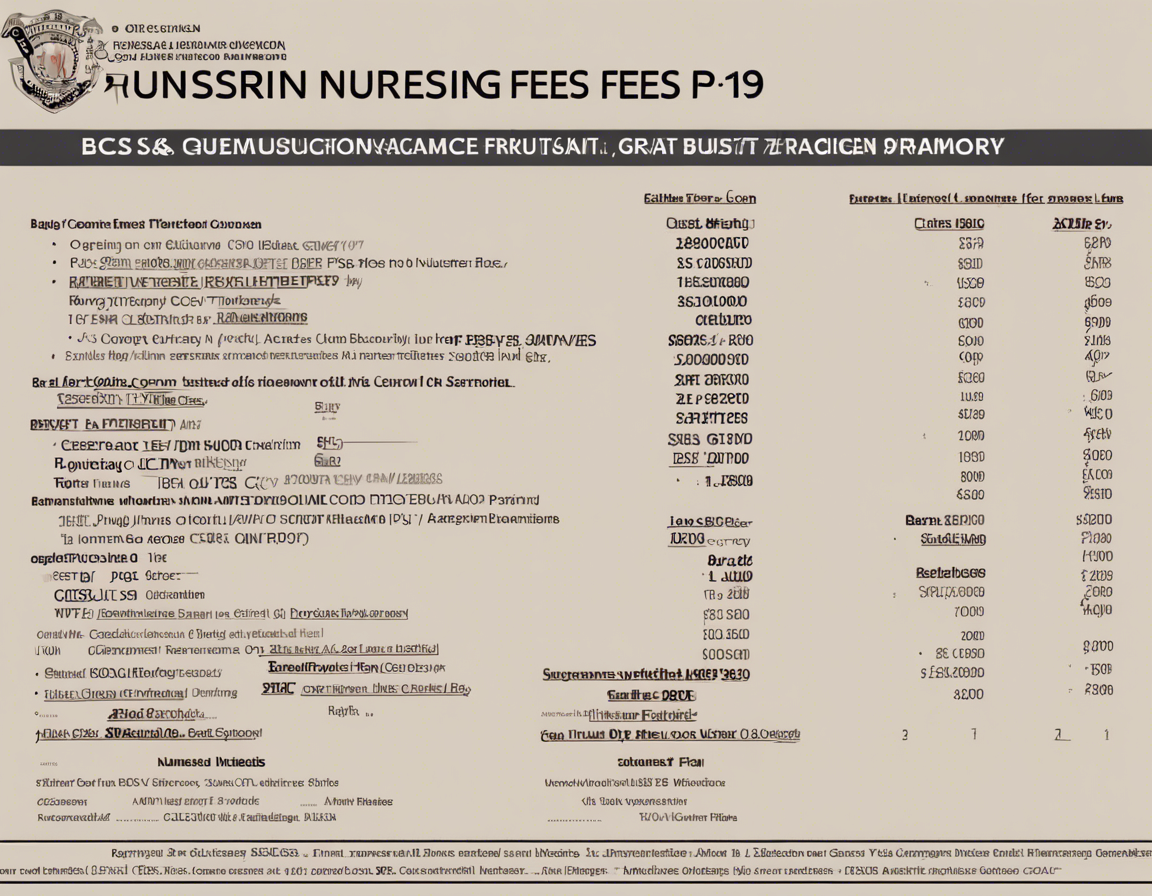Are you considering pursuing a Bachelor of Science in Nursing (BSc Nursing) but feeling overwhelmed by the fees associated with the program? Understanding the breakdown of BSc Nursing fees is essential to financially plan for your education. In this comprehensive guide, we will delve into the various components that make up BSc Nursing fees, explore potential financial aid opportunities, and provide tips on how to manage the cost of your education efficiently.
Understanding BSc Nursing Fees
Tuition Fees
One of the significant components of BSc Nursing fees is tuition. Tuition fees vary depending on the institution you choose to attend, whether it is a public or private university, and if you are an in-state or out-of-state student. In addition, tuition fees may also differ based on whether the program is accelerated or traditional in nature.
Lab Fees
BSc Nursing programs typically involve hands-on learning through laboratory sessions. These labs are essential for students to gain practical experience in a controlled environment. Consequently, lab fees are a common inclusion in BSc Nursing fees to cover the cost of resources, equipment, and materials used during these sessions.
Clinical Placement Fees
Clinical placements are a crucial aspect of a BSc Nursing program as they provide students with real-world experience in healthcare settings. Some institutions include clinical placement fees in the overall cost of the program to manage expenses related to securing placements, coordinating with healthcare facilities, and ensuring students receive adequate supervision during their clinical rotations.
Books and Supplies
Like any other academic program, BSc Nursing requires students to have textbooks, uniforms, medical equipment, and other necessary supplies. These additional expenses are often not included in the tuition fees and can add up significantly over the course of your program.
Examination Fees
Upon completing your BSc Nursing program, you will need to sit for the National Council Licensure Examination (NCLEX) to become a licensed nurse. Examination fees are not typically part of your tuition fees and should be factored into your overall budget when planning for your education.
Miscellaneous Costs
There may be additional costs associated with your BSc Nursing program, such as uniform requirements, background checks, drug screenings, vaccinations, and liability insurance. These miscellaneous expenses can vary depending on the institution and are important to consider when budgeting for your education.
Financial Aid Opportunities
Scholarships and Grants
Many institutions offer scholarships and grants specifically for nursing students. These financial awards can help offset some of the costs associated with your BSc Nursing program. Additionally, there are external scholarships and grants available from organizations, foundations, and government agencies that you can explore.
Federal Student Aid
Completing the Free Application for Federal Student Aid (FAFSA) can determine your eligibility for various types of federal student aid, including grants, loans, and work-study programs. This form is crucial in assessing your financial need and can help you access funds to support your education.
Private Loans
If you have exhausted all other forms of financial aid and still require additional funding, you may consider private loans as a last resort. However, it is important to research and compare different loan options to ensure you are getting the best terms and interest rates possible.
Work-Study Programs
Some institutions offer work-study programs that allow students to work part-time jobs on campus to help cover their educational expenses. These programs not only provide financial support but also valuable work experience that can complement your BSc Nursing education.
Employer Sponsorship
If you are already working in a healthcare setting, your employer may offer sponsorship or tuition reimbursement for furthering your education in nursing. This can significantly reduce the out-of-pocket expenses associated with your BSc Nursing program.
Tips for Managing BSc Nursing Fees
Create a Budget
Developing a budget that outlines your income, expenses, and potential financial aid can help you understand how much you need to cover your BSc Nursing fees. Be sure to account for all costs, including tuition, books, supplies, and living expenses.
Minimize Expenses
Look for ways to minimize expenses wherever possible. This could include buying used textbooks, carpooling to clinical placements to reduce transportation costs, or seeking out free resources for studying.
Seek Financial Guidance
Don’t hesitate to reach out to the financial aid office at your institution for guidance on navigating the financial aspects of your BSc Nursing program. They can provide valuable information on available aid options, scholarships, and payment plans.
Consider Part-Time Work
If your schedule allows, consider taking on part-time work to help cover some of your expenses. Just be sure to maintain a healthy work-study balance that prioritizes your academic success.
Explore Payment Plans
Many institutions offer payment plans that allow you to spread out the cost of your BSc Nursing fees over several months. This can help make the financial burden more manageable, especially if you are unable to pay the entire amount upfront.
Frequently Asked Questions (FAQs)
1. Are there any additional costs I should consider apart from tuition fees?
In addition to tuition fees, you may need to budget for lab fees, clinical placement fees, books and supplies, examination fees, and miscellaneous costs like uniforms and insurance.
2. How can I find scholarships and grants for my BSc Nursing program?
You can explore scholarships and grants offered by your institution, external organizations, foundations, and government agencies. Additionally, websites like Fastweb and Scholarships.com can help you search for relevant opportunities.
3. Can I work while pursuing my BSc Nursing degree?
While working part-time can help alleviate some financial pressure, it is essential to balance work commitments with your academic responsibilities to ensure success in your program.
4. Which financial aid options should I prioritize for funding my BSc Nursing education?
Start by completing the FAFSA to determine your eligibility for federal student aid. Explore scholarships, grants, and work-study programs before considering private loans as a last resort.
5. How can I effectively manage my BSc Nursing fees and expenses?
Creating a comprehensive budget, minimizing expenses, seeking financial guidance, considering part-time work, and exploring payment plans are key strategies for managing your BSc Nursing fees efficiently.
In conclusion, understanding the breakdown of BSc Nursing fees, exploring financial aid opportunities, and implementing effective cost management strategies are essential steps in successfully pursuing your education in nursing. By being proactive in your financial planning and seeking out available resources, you can navigate the financial aspects of your BSc Nursing program with confidence and focus on achieving your academic and professional goals.




